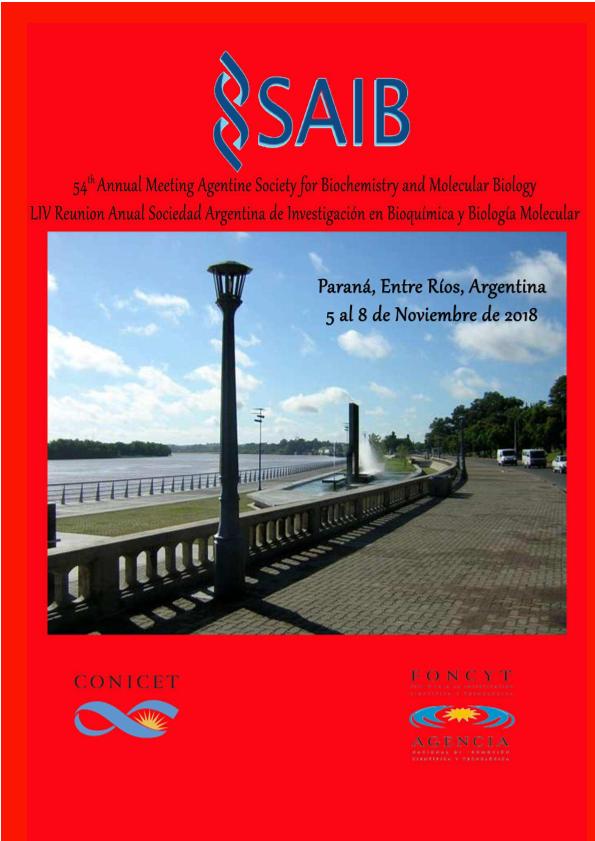Evento
Effect of probiotic bacteria isolated from Patagonia on zebrafish gut microbiota and growth
Garcés, Marisa Elisabeth ; Olivera, Nelda Lila
; Olivera, Nelda Lila ; Moris, Mariano
; Moris, Mariano ; Iglesias, Martín Sebastián
; Iglesias, Martín Sebastián ; Castaños, Cecilia; Sequeiros, Cynthia
; Castaños, Cecilia; Sequeiros, Cynthia
 ; Olivera, Nelda Lila
; Olivera, Nelda Lila ; Moris, Mariano
; Moris, Mariano ; Iglesias, Martín Sebastián
; Iglesias, Martín Sebastián ; Castaños, Cecilia; Sequeiros, Cynthia
; Castaños, Cecilia; Sequeiros, Cynthia
Tipo del evento:
Reunión
Nombre del evento:
54th Annual Meeting Agentine Society for Biochemistry and Molecular Biology
Fecha del evento:
05/11/2018
Institución Organizadora:
Consejo Nacional de Investigaciones Científicas y Técnicas;
Sociedad Española de Bioquímica y Biología Molecular;
Título de la revista:
Biocell
Editorial:
Tech Science Press
e-ISSN:
1667-5746
Idioma:
Inglés
Clasificación temática:
Resumen
Probiotics are an interesting alternative for sustainable aquaculture. The aim of this study was to assess the effect of probiotic bacteria isolated from Patagonian fish (T4, H16, and TW34) on gut microbiota and growth performance using zebrafish as an experimental model. Assays included one recirculating system (3 tanks) for each probiotic treatment (commercial feed inoculated with one probiotic strain at 1x107 CFU/g) and a control system (only commercial feed). Each tank was randomly stocked with 18 fish, whose weight and length were determined at 0, 15, 30, 60, and 90 days during probiotic treatment. Fish specific growth rate (SGR), condition factor (K), and food conversion ratio (FCR) were also calculated. Total viable bacteria, lactic acid bacteria (LAB), enterobacteria, and Vibrio spp. were quantified by plate-counting to assess the intestinal microbiota at the end of the experiment. As the probiotic strains have antimicrobial activity against fish pathogens, their abundances were detected using the double layer agar method. After 90 days of treatment with T4, H16, or TW34, intestine LAB counts were higher, and Vibrio spp. and enterobacteria lower than those of the control group. Strains T4, H16, or TW34 were recovered from the intestinal microbiota of treated fish (6.8, 7.24, and 7.4 Log10CFU/g of intestine, respectively). At the same time, fish weight of groups fed with T4 or H16 was significantly greater than that of the control. Particularly, fish treated with H16 showed the highest SGR and K, and the lowest FCR, thus its application in aquaculture could be promising.
Palabras clave:
ZEBRAFISH
,
PROBIOTIC
,
INTESTINAL TRACT
,
LACTIC ACID BACTERIA
Archivos asociados
Licencia
Identificadores
Colecciones
Eventos(CESIMAR)
Eventos de CENTRO PARA EL ESTUDIO DE SISTEMAS MARINOS
Eventos de CENTRO PARA EL ESTUDIO DE SISTEMAS MARINOS
Eventos(IPEEC)
Eventos de INSTITUTO PATAGONICO PARA EL ESTUDIO DE LOS ECOSISTEMAS CONTINENTALES
Eventos de INSTITUTO PATAGONICO PARA EL ESTUDIO DE LOS ECOSISTEMAS CONTINENTALES
Citación
Effect of probiotic bacteria isolated from Patagonia on zebrafish gut microbiota and growth; 54th Annual Meeting Agentine Society for Biochemistry and Molecular Biology; Paraná; Argentina; 2018; 70-71
Compartir



